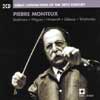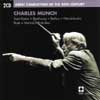Great Conductors of the 20th Century – Charles Munch
An uneven Munch set which nonetheless pulls out a real plum in the Martinu, and a set of quintessential Monteux
View record and artist detailsRecord and Artist Details
Composer or Director: Claude Debussy, Paul Hindemith, Claude-Joseph Rouget De Lisle, Richard Wagner, Pyotr Ilyich Tchaikovsky, Ludwig van Beethoven
Genre:
Orchestral
Label: Great Conductors of the 20th century
Magazine Review Date: 9/2003
Media Format: CD or Download
Media Runtime: 147
Mastering:
Stereo
Mono
ADD
Catalogue Number: 5 75474-2

Tracks:
| Composition | Artist Credit |
|---|---|
| Symphony No. 2 |
Ludwig van Beethoven, Composer
Ludwig van Beethoven, Composer North German Radio Symphony Orchestra Pierre Monteux, Conductor |
| Tristan und Isolde, Movement: Prelude and Liebestod (concert version: arr. Humpe |
Richard Wagner, Composer
North German Radio Symphony Orchestra Pierre Monteux, Conductor Richard Wagner, Composer |
| Mathis der Maler |
Paul Hindemith, Composer
Danish State Radio Symphony Orchestra Paul Hindemith, Composer Pierre Monteux, Conductor |
| Nocturnes |
Claude Debussy, Composer
Berkshire Festival Chorus Boston Symphony Orchestra Claude Debussy, Composer Pierre Monteux, Conductor |
| (The) Sleeping Beauty, Movement: Introduction |
Pyotr Ilyich Tchaikovsky, Composer
Pyotr Ilyich Tchaikovsky, Composer |
| (The) Sleeping Beauty |
Pyotr Ilyich Tchaikovsky, Composer
London Symphony Orchestra Pierre Monteux, Conductor Pyotr Ilyich Tchaikovsky, Composer |
| (The) Sleeping Beauty, Movement: Entrance of King and Court |
Pyotr Ilyich Tchaikovsky, Composer
London Symphony Orchestra Pierre Monteux, Conductor Pyotr Ilyich Tchaikovsky, Composer |
| (The) Sleeping Beauty, Movement: Pas de Six Fairies present gifts |
Pyotr Ilyich Tchaikovsky, Composer
London Symphony Orchestra Pierre Monteux, Conductor Pyotr Ilyich Tchaikovsky, Composer |
| (The) Sleeping Beauty, Movement: Valse |
Pyotr Ilyich Tchaikovsky, Composer
London Symphony Orchestra Pierre Monteux, Conductor Pyotr Ilyich Tchaikovsky, Composer |
| (The) Sleeping Beauty, Movement: Pas d'action: |
Pyotr Ilyich Tchaikovsky, Composer
London Symphony Orchestra Pierre Monteux, Conductor Pyotr Ilyich Tchaikovsky, Composer |
| (The) Sleeping Beauty, Movement: Finale La Fée des lilas paraît |
Pyotr Ilyich Tchaikovsky, Composer
London Symphony Orchestra Pierre Monteux, Conductor Pyotr Ilyich Tchaikovsky, Composer |
| (The) Sleeping Beauty, Movement: Scene Allegro agitato |
Pyotr Ilyich Tchaikovsky, Composer
London Symphony Orchestra Pierre Monteux, Conductor Pyotr Ilyich Tchaikovsky, Composer |
| (The) Sleeping Beauty, Movement: Panorama (Andantino) |
Pyotr Ilyich Tchaikovsky, Composer
London Symphony Orchestra Pierre Monteux, Conductor Pyotr Ilyich Tchaikovsky, Composer |
| (The) Sleeping Beauty, Movement: ~ |
Pyotr Ilyich Tchaikovsky, Composer
London Symphony Orchestra Pierre Monteux, Conductor Pyotr Ilyich Tchaikovsky, Composer |
| (The) Sleeping Beauty, Movement: Polacca (Allegro moderato) |
Pyotr Ilyich Tchaikovsky, Composer
London Symphony Orchestra Pierre Monteux, Conductor Pyotr Ilyich Tchaikovsky, Composer |
| (The) Sleeping Beauty, Movement: Pas de quatre: |
Pyotr Ilyich Tchaikovsky, Composer
London Symphony Orchestra Pierre Monteux, Conductor Pyotr Ilyich Tchaikovsky, Composer |
| (The) Sleeping Beauty, Movement: Pas de caractère (Red Riding Hood) |
Pyotr Ilyich Tchaikovsky, Composer
London Symphony Orchestra Pierre Monteux, Conductor Pyotr Ilyich Tchaikovsky, Composer |
| (The) Sleeping Beauty, Movement: Pas de deux: |
Pyotr Ilyich Tchaikovsky, Composer
London Symphony Orchestra Pierre Monteux, Conductor Pyotr Ilyich Tchaikovsky, Composer |
| (The) Sleeping Beauty, Movement: Finale: |
Pyotr Ilyich Tchaikovsky, Composer
London Symphony Orchestra Pierre Monteux, Conductor Pyotr Ilyich Tchaikovsky, Composer |
| (La) Marseillaise (Hymne des Marseillais) |
Claude-Joseph Rouget De Lisle, Composer
Claude-Joseph Rouget De Lisle, Composer London Symphony Orchestra Pierre Monteux, Conductor |
Composer or Director: Camille Saint-Saëns, Sergey Prokofiev, Felix Mendelssohn, Hector Berlioz, Georges Bizet, Bohuslav (Jan) Martinu, Ludwig van Beethoven
Genre:
Orchestral
Label: Great Conductors of the 20th century
Magazine Review Date: 9/2003
Media Format: CD or Download
Media Runtime: 156
Mastering:
Stereo
Mono
ADD
Catalogue Number: 575477-2

Tracks:
| Composition | Artist Credit |
|---|---|
| (La) princesse jaune |
Camille Saint-Saëns, Composer
Boston Symphony Orchestra Camille Saint-Saëns, Composer Charles Munch, Conductor |
| Symphony No. 9, 'Choral' |
Ludwig van Beethoven, Composer
Boston Symphony Orchestra Charles Munch, Conductor David Poleri, Tenor Giorgio Tozzi, Bass Leontyne Price, Soprano Ludwig van Beethoven, Composer Maureen Forrester, Contralto (Female alto) New England Conservatory Chorus |
| (Le) Corsaire |
Hector Berlioz, Composer
Charles Munch, Conductor Conservatoire Concert Society Orchestra Hector Berlioz, Composer |
| Octet for strings, Movement: Scherzo (Allegro leggierissimo) |
Felix Mendelssohn, Composer
Boston Symphony Orchestra Charles Munch, Conductor Felix Mendelssohn, Composer |
| Symphony |
Georges Bizet, Composer
Charles Munch, Conductor French National Radio Orchestra Georges Bizet, Composer |
| Symphony No. 6, 'Fantaisies symphoniques' |
Bohuslav (Jan) Martinu, Composer
Bohuslav (Jan) Martinu, Composer Boston Symphony Orchestra Charles Munch, Conductor |
| Romeo and Juliet, Movement: Death of Tybalt |
Sergey Prokofiev, Composer
Boston Symphony Orchestra Charles Munch, Conductor Sergey Prokofiev, Composer |
| Romeo and Juliet, Movement: Montagues and Capulets |
Sergey Prokofiev, Composer
Boston Symphony Orchestra Charles Munch, Conductor Sergey Prokofiev, Composer |
| Romeo and Juliet, Movement: Dance |
Sergey Prokofiev, Composer
Boston Symphony Orchestra Charles Munch, Conductor Sergey Prokofiev, Composer |
| Romeo and Juliet, Movement: Romeo and Juliet before parting |
Sergey Prokofiev, Composer
Boston Symphony Orchestra Charles Munch, Conductor Sergey Prokofiev, Composer |
Author: jswain
Take the first movement, a lively and forceful ma non troppo, but there’s very little happening (it’s streamlined, dynamically and texturally). While the inner movements have their moments, Munch’s ambitions for the finale don’t seem to include much beyond encouraging animal exuberance. Which he does (by the shed-load). Sorry to be so negative – as a long-term admirer, it grieves me to be writing the kind of stuff that, a few decades ago, I used to read in Gramophone.
Sadly, the 1966 Bizet Symphony is another example of Munch at less than his best, tempi relatively safe and the French Radio Orchestra’s strings (over-bright and studio-bound) sounding more than ideally bulky for the piece. All rather strenuous next to his more poised and pointed 1963 recording with the Royal Philharmonic.
But – and this is definitely a positive ‘but’ – if you ever harboured thoughts about French orchestras half a century ago not being able to cut the mustard when it came to virtuoso display, you need to hear this 1948 Paris Conservatoire Berlioz Le corsaire. Indeed, I would venture to suggest that life is incomplete until acquaintance is made with Munch conducting Le corsaire – completely dazzling and dizzying; this Paris account explores less than his later Boston one and is in mono (with traces of distortion on the brass), but here is all the care over the finer points – articulation, balance, phrasing – that seems absent from his Beethoven 9.
That care is present for everything else in this set – the daring and the deft touch in the Saint-Saëns transforming silver into gold, excerpts from Prokofiev’s Romeo and Juliet leaving you wanting more (the ‘Dance of the Knights’ a touch formal, but perhaps appropriately so), and by far the most valuable inclusion here, Martinu’s Sixth Symphony, recorded in 1956 just months after Ancerl’s famous Supraphon disc.
Martinu wrote the piece for Munch and the Bostonians, and if Ancerl had been blessed with the kind of recorded sound Munch has here, honours might be more evenly divided. As it is, his moderately informative mono is no match for Munch’s vivid stereo. More importantly, listening to this is to wonder whether Martin<= wrote what he did because he knew that, on a good day, only Munch and Boston could bring it off. This was a good day, the music unusually fraught with detonations and anguish. Listen to the excitement Munch reserves for the finale’s last burst of energy – here a worrying moment of significance, with others, so often, just another wind-up. No one can properly evaluate Martinu’s Sixth until they’ve heard this recording.
Nothing quite as spellbinding in Monteux’s set, though plenty that is special. His 1960 Beethoven Second with the NDR Orchestra is – like almost everything here – poised, springy, fresh, superbly balanced, and marginally more lively and dynamic than his contemporary LSO account, if less openly recorded. The NDR’s cellos in the 1964 Tristan Prelude and Liebestod are not the most alluring, but who cares; this is a tantalising glimpse of what Monteux’s Wagner was like – a glimpse being all the record companies managed to catch of a particular passion of his. The playing here, to a degree, is ‘chamber-like’ (the scale, too), in other words, superbly contoured and properly reactive, the pulse forever changing. Astonishing how Monteux is always teaching you new ways of listening.
The only mono recording in this set is the live Hindemith Mathis der Maler Symphony from Copenhagen – a pity, as we don’t have the benefit, heard everywhere else in the set, of Monteux’s antiphonally divided first and second violins. Neither, on this occasion, did he have an orchestra good enough to realise his vision of the piece (which includes a very challenging speed as St Anthony, in the finale, rushes towards those final brass ‘Alleluias’). Overall, it’s not quite as illuminating – or competitive – as I had hoped.
The Boston Debussy Nocturnes should be, more than it is. Initially, for a 1955 recording, this may strike you something of a miracle, but it is not to last. As in the recording’s previous outing in RCA’s Monteux Edition (9/94), dynamic compression robs much of ‘Fêtes’ and the central climax in ‘Sirènes’ of power. The balances in ‘Sirènes’ are occasionally peculiar (moments where the chorus seems closer than the orchestra), and the last bars sound tacked on from a different take with higher level. But when it’s good, it’s wonderful – ‘Nuages’ especially. Was there any conductor who knew more about the variety of expressive colour possible from strings?
Or about the dance? The 50-minute selection from a 1957 Tchaikovsky Sleeping Beauty was among the first recordings he made with the LSO – his appointment as their principal conductor was some four years in the future – but the sheer élan and lightness of touch belong to another world. No striving for the epic here. Monteux fairly breezes through the numbers, but never insensitively (with what style he manages his two different tempi for the Act 1 Waltz!), and if his delightfully animated ‘Bluebird’ doesn’t raise a smile, you’re a lost cause. Essential Monteux – one to cherish.
I’m afraid I’ve no idea what occasion was being celebrated with the rehearsal rendition of the Marseillaise at the end, but it, and Monteux’s thank you afterwards, are a very fitting way to close the musical offerings.
Discover the world's largest classical music catalogue with Presto Music.

Gramophone Digital Club
- Digital Edition
- Digital Archive
- Reviews Database
- Full website access
From £8.75 / month
Subscribe
Gramophone Full Club
- Print Edition
- Digital Edition
- Digital Archive
- Reviews Database
- Full website access
From £11.00 / month
Subscribe
If you are a library, university or other organisation that would be interested in an institutional subscription to Gramophone please click here for further information.




